Professional Behaviors and Ethical Leadership: Alex Ferguson's Impact
VerifiedAdded on 2022/08/16
|13
|3546
|19
Report
AI Summary
This report provides a comprehensive analysis of Sir Alex Ferguson's professional sporting managerial approach, focusing on his ethical leadership and management style. It begins with an introduction to professionalism and ethical leadership, setting the stage for an examination of Ferguson's career at Manchester United. The report identifies key professional behaviors essential for sports management, such as self-confidence and emotional intelligence, linking them to relevant theoretical frameworks like self-efficacy theory and Goleman’s learning theory. It explores how Ferguson demonstrated these behaviors, contributing to his success. The report then delves into Ferguson's leadership style, associating it with the Path-Goal theory and Vroom's expectancy theory, highlighting his disciplinary approach and ability to motivate his team. The analysis includes examples of Ferguson's management decisions and their impact, offering insights into his strategic approach to team building, player management, and maintaining high ethical standards, ultimately explaining factors that contributed to his effectiveness in the field of sports management.

Running head: MANAGEMENT
MANAGEMENT
Name of the Student:
Name of the University:
Author note:
MANAGEMENT
Name of the Student:
Name of the University:
Author note:
Paraphrase This Document
Need a fresh take? Get an instant paraphrase of this document with our AI Paraphraser
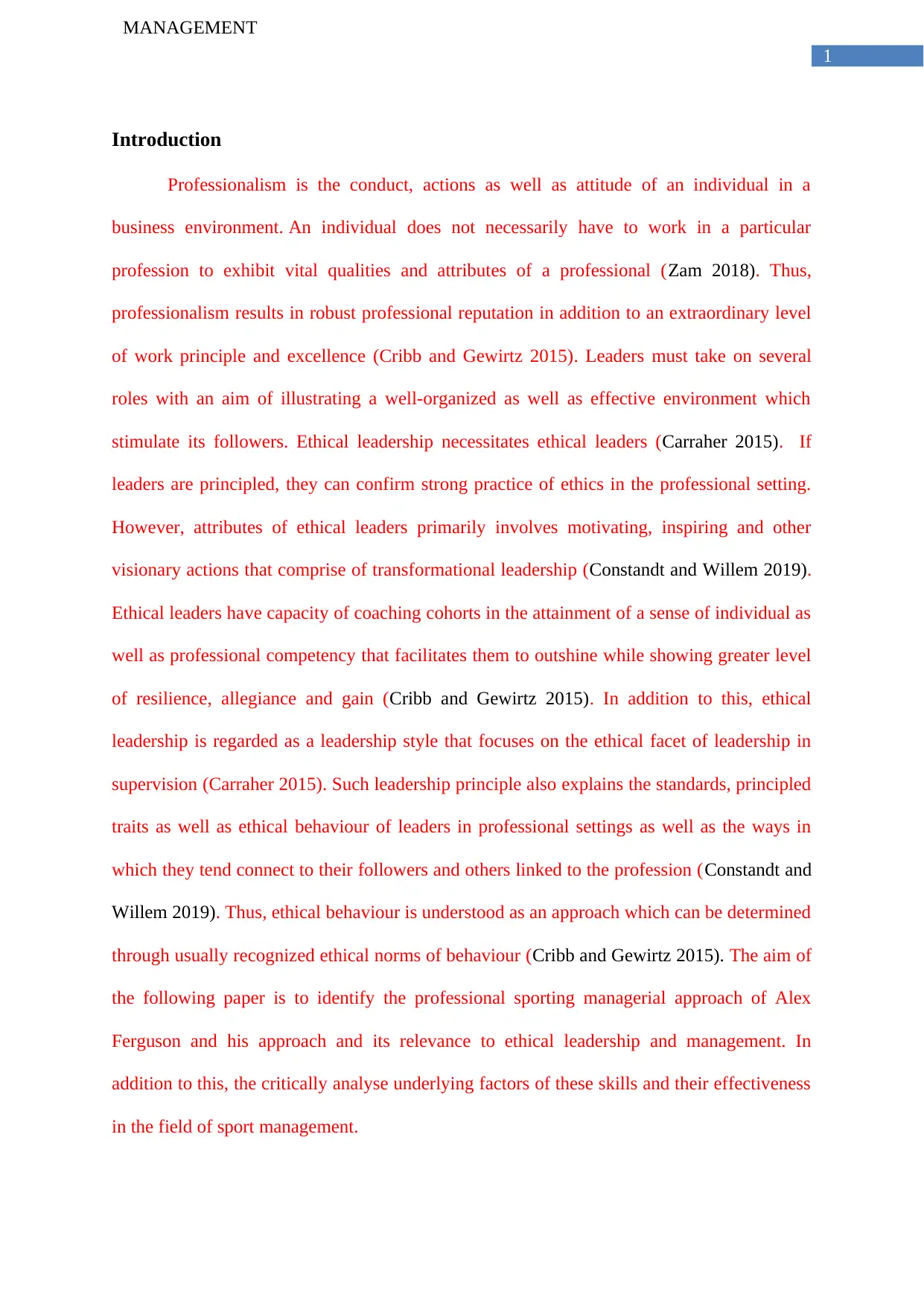
1
MANAGEMENT
Introduction
Professionalism is the conduct, actions as well as attitude of an individual in a
business environment. An individual does not necessarily have to work in a particular
profession to exhibit vital qualities and attributes of a professional (Zam 2018). Thus,
professionalism results in robust professional reputation in addition to an extraordinary level
of work principle and excellence (Cribb and Gewirtz 2015). Leaders must take on several
roles with an aim of illustrating a well-organized as well as effective environment which
stimulate its followers. Ethical leadership necessitates ethical leaders (Carraher 2015). If
leaders are principled, they can confirm strong practice of ethics in the professional setting.
However, attributes of ethical leaders primarily involves motivating, inspiring and other
visionary actions that comprise of transformational leadership (Constandt and Willem 2019).
Ethical leaders have capacity of coaching cohorts in the attainment of a sense of individual as
well as professional competency that facilitates them to outshine while showing greater level
of resilience, allegiance and gain (Cribb and Gewirtz 2015). In addition to this, ethical
leadership is regarded as a leadership style that focuses on the ethical facet of leadership in
supervision (Carraher 2015). Such leadership principle also explains the standards, principled
traits as well as ethical behaviour of leaders in professional settings as well as the ways in
which they tend connect to their followers and others linked to the profession (Constandt and
Willem 2019). Thus, ethical behaviour is understood as an approach which can be determined
through usually recognized ethical norms of behaviour (Cribb and Gewirtz 2015). The aim of
the following paper is to identify the professional sporting managerial approach of Alex
Ferguson and his approach and its relevance to ethical leadership and management. In
addition to this, the critically analyse underlying factors of these skills and their effectiveness
in the field of sport management.
MANAGEMENT
Introduction
Professionalism is the conduct, actions as well as attitude of an individual in a
business environment. An individual does not necessarily have to work in a particular
profession to exhibit vital qualities and attributes of a professional (Zam 2018). Thus,
professionalism results in robust professional reputation in addition to an extraordinary level
of work principle and excellence (Cribb and Gewirtz 2015). Leaders must take on several
roles with an aim of illustrating a well-organized as well as effective environment which
stimulate its followers. Ethical leadership necessitates ethical leaders (Carraher 2015). If
leaders are principled, they can confirm strong practice of ethics in the professional setting.
However, attributes of ethical leaders primarily involves motivating, inspiring and other
visionary actions that comprise of transformational leadership (Constandt and Willem 2019).
Ethical leaders have capacity of coaching cohorts in the attainment of a sense of individual as
well as professional competency that facilitates them to outshine while showing greater level
of resilience, allegiance and gain (Cribb and Gewirtz 2015). In addition to this, ethical
leadership is regarded as a leadership style that focuses on the ethical facet of leadership in
supervision (Carraher 2015). Such leadership principle also explains the standards, principled
traits as well as ethical behaviour of leaders in professional settings as well as the ways in
which they tend connect to their followers and others linked to the profession (Constandt and
Willem 2019). Thus, ethical behaviour is understood as an approach which can be determined
through usually recognized ethical norms of behaviour (Cribb and Gewirtz 2015). The aim of
the following paper is to identify the professional sporting managerial approach of Alex
Ferguson and his approach and its relevance to ethical leadership and management. In
addition to this, the critically analyse underlying factors of these skills and their effectiveness
in the field of sport management.
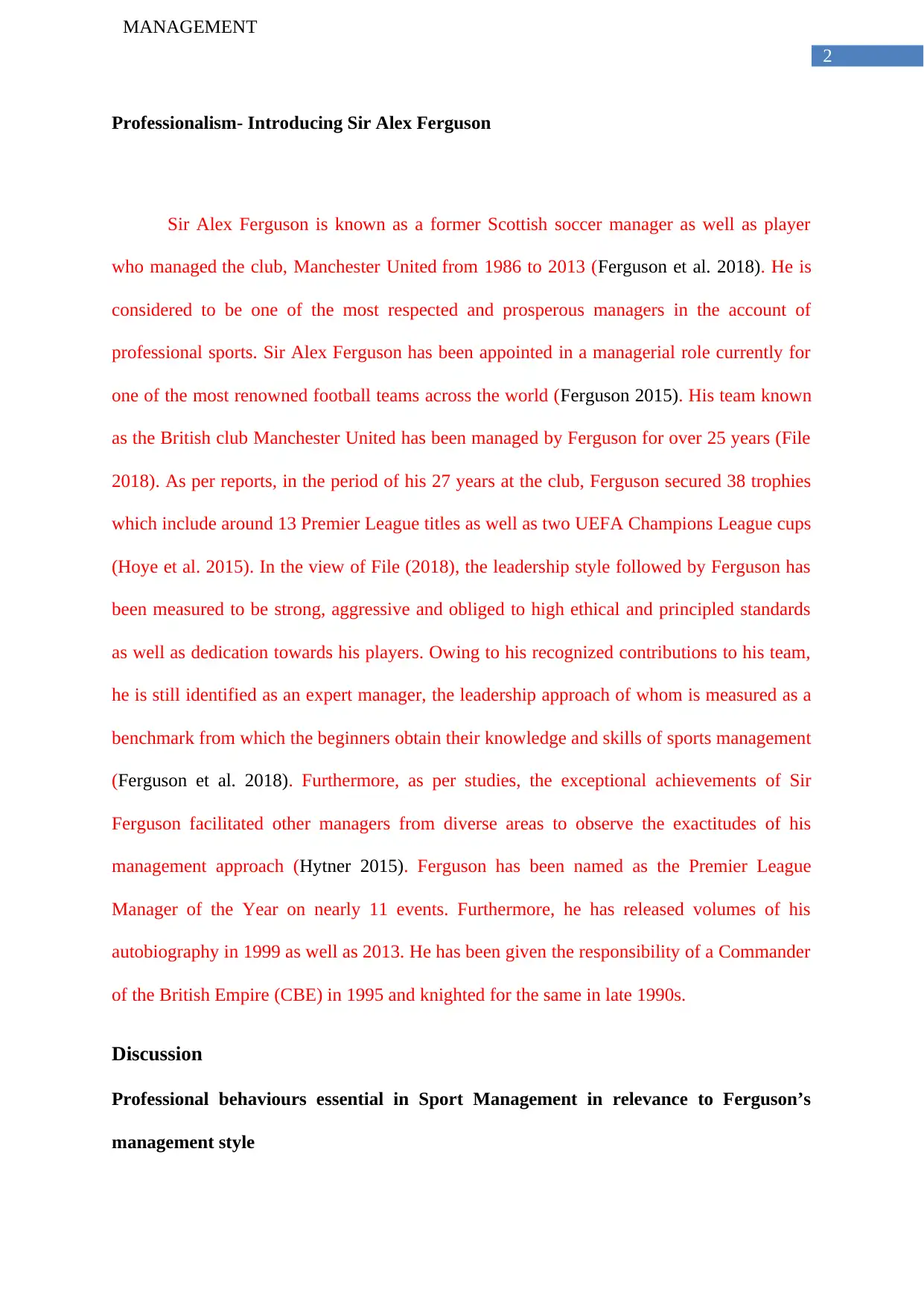
2
MANAGEMENT
Professionalism- Introducing Sir Alex Ferguson
Sir Alex Ferguson is known as a former Scottish soccer manager as well as player
who managed the club, Manchester United from 1986 to 2013 (Ferguson et al. 2018). He is
considered to be one of the most respected and prosperous managers in the account of
professional sports. Sir Alex Ferguson has been appointed in a managerial role currently for
one of the most renowned football teams across the world (Ferguson 2015). His team known
as the British club Manchester United has been managed by Ferguson for over 25 years (File
2018). As per reports, in the period of his 27 years at the club, Ferguson secured 38 trophies
which include around 13 Premier League titles as well as two UEFA Champions League cups
(Hoye et al. 2015). In the view of File (2018), the leadership style followed by Ferguson has
been measured to be strong, aggressive and obliged to high ethical and principled standards
as well as dedication towards his players. Owing to his recognized contributions to his team,
he is still identified as an expert manager, the leadership approach of whom is measured as a
benchmark from which the beginners obtain their knowledge and skills of sports management
(Ferguson et al. 2018). Furthermore, as per studies, the exceptional achievements of Sir
Ferguson facilitated other managers from diverse areas to observe the exactitudes of his
management approach (Hytner 2015). Ferguson has been named as the Premier League
Manager of the Year on nearly 11 events. Furthermore, he has released volumes of his
autobiography in 1999 as well as 2013. He has been given the responsibility of a Commander
of the British Empire (CBE) in 1995 and knighted for the same in late 1990s.
Discussion
Professional behaviours essential in Sport Management in relevance to Ferguson’s
management style
MANAGEMENT
Professionalism- Introducing Sir Alex Ferguson
Sir Alex Ferguson is known as a former Scottish soccer manager as well as player
who managed the club, Manchester United from 1986 to 2013 (Ferguson et al. 2018). He is
considered to be one of the most respected and prosperous managers in the account of
professional sports. Sir Alex Ferguson has been appointed in a managerial role currently for
one of the most renowned football teams across the world (Ferguson 2015). His team known
as the British club Manchester United has been managed by Ferguson for over 25 years (File
2018). As per reports, in the period of his 27 years at the club, Ferguson secured 38 trophies
which include around 13 Premier League titles as well as two UEFA Champions League cups
(Hoye et al. 2015). In the view of File (2018), the leadership style followed by Ferguson has
been measured to be strong, aggressive and obliged to high ethical and principled standards
as well as dedication towards his players. Owing to his recognized contributions to his team,
he is still identified as an expert manager, the leadership approach of whom is measured as a
benchmark from which the beginners obtain their knowledge and skills of sports management
(Ferguson et al. 2018). Furthermore, as per studies, the exceptional achievements of Sir
Ferguson facilitated other managers from diverse areas to observe the exactitudes of his
management approach (Hytner 2015). Ferguson has been named as the Premier League
Manager of the Year on nearly 11 events. Furthermore, he has released volumes of his
autobiography in 1999 as well as 2013. He has been given the responsibility of a Commander
of the British Empire (CBE) in 1995 and knighted for the same in late 1990s.
Discussion
Professional behaviours essential in Sport Management in relevance to Ferguson’s
management style
⊘ This is a preview!⊘
Do you want full access?
Subscribe today to unlock all pages.

Trusted by 1+ million students worldwide
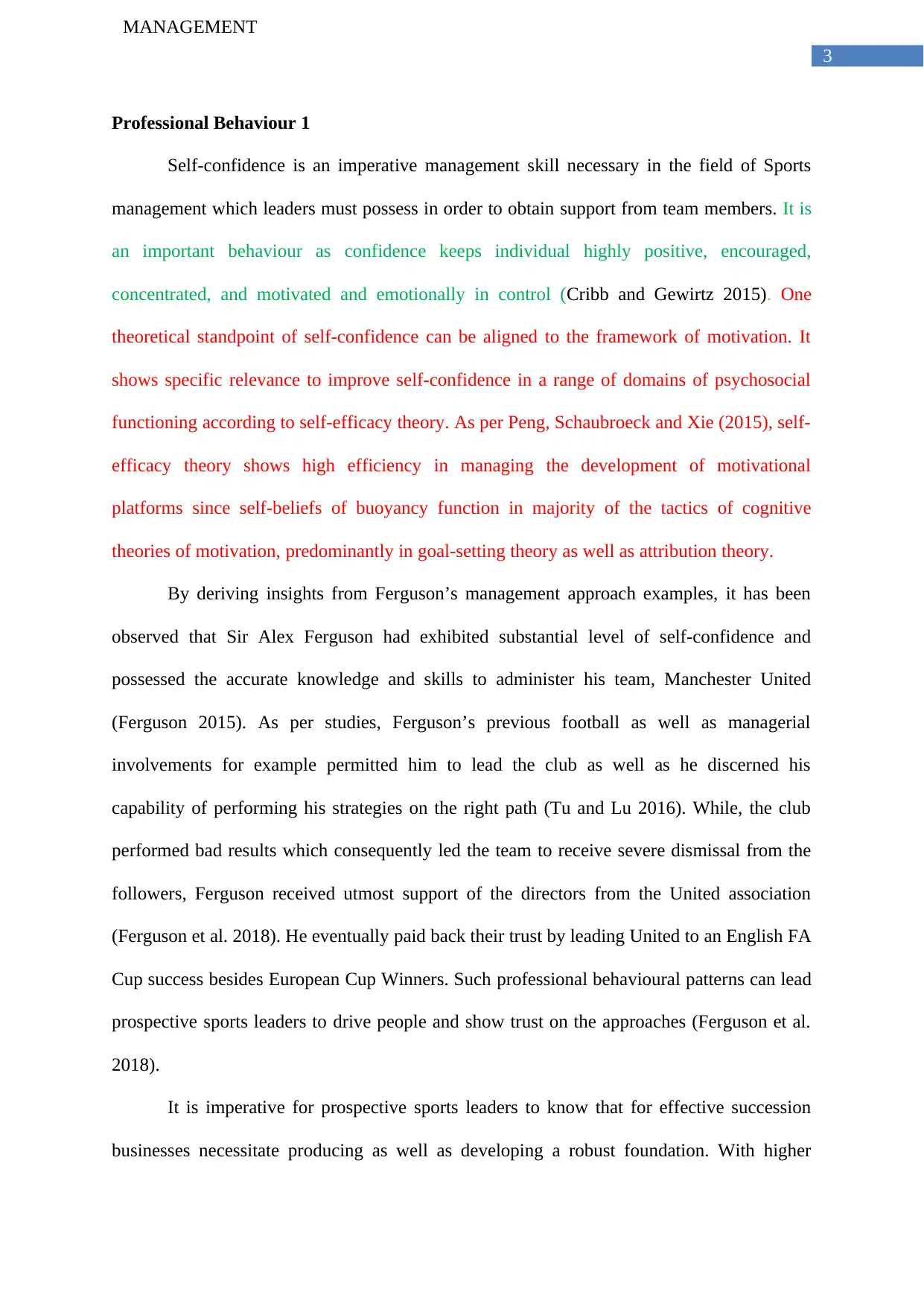
3
MANAGEMENT
Professional Behaviour 1
Self-confidence is an imperative management skill necessary in the field of Sports
management which leaders must possess in order to obtain support from team members. It is
an important behaviour as confidence keeps individual highly positive, encouraged,
concentrated, and motivated and emotionally in control (Cribb and Gewirtz 2015). One
theoretical standpoint of self-confidence can be aligned to the framework of motivation. It
shows specific relevance to improve self-confidence in a range of domains of psychosocial
functioning according to self-efficacy theory. As per Peng, Schaubroeck and Xie (2015), self-
efficacy theory shows high efficiency in managing the development of motivational
platforms since self-beliefs of buoyancy function in majority of the tactics of cognitive
theories of motivation, predominantly in goal-setting theory as well as attribution theory.
By deriving insights from Ferguson’s management approach examples, it has been
observed that Sir Alex Ferguson had exhibited substantial level of self-confidence and
possessed the accurate knowledge and skills to administer his team, Manchester United
(Ferguson 2015). As per studies, Ferguson’s previous football as well as managerial
involvements for example permitted him to lead the club as well as he discerned his
capability of performing his strategies on the right path (Tu and Lu 2016). While, the club
performed bad results which consequently led the team to receive severe dismissal from the
followers, Ferguson received utmost support of the directors from the United association
(Ferguson et al. 2018). He eventually paid back their trust by leading United to an English FA
Cup success besides European Cup Winners. Such professional behavioural patterns can lead
prospective sports leaders to drive people and show trust on the approaches (Ferguson et al.
2018).
It is imperative for prospective sports leaders to know that for effective succession
businesses necessitate producing as well as developing a robust foundation. With higher
MANAGEMENT
Professional Behaviour 1
Self-confidence is an imperative management skill necessary in the field of Sports
management which leaders must possess in order to obtain support from team members. It is
an important behaviour as confidence keeps individual highly positive, encouraged,
concentrated, and motivated and emotionally in control (Cribb and Gewirtz 2015). One
theoretical standpoint of self-confidence can be aligned to the framework of motivation. It
shows specific relevance to improve self-confidence in a range of domains of psychosocial
functioning according to self-efficacy theory. As per Peng, Schaubroeck and Xie (2015), self-
efficacy theory shows high efficiency in managing the development of motivational
platforms since self-beliefs of buoyancy function in majority of the tactics of cognitive
theories of motivation, predominantly in goal-setting theory as well as attribution theory.
By deriving insights from Ferguson’s management approach examples, it has been
observed that Sir Alex Ferguson had exhibited substantial level of self-confidence and
possessed the accurate knowledge and skills to administer his team, Manchester United
(Ferguson 2015). As per studies, Ferguson’s previous football as well as managerial
involvements for example permitted him to lead the club as well as he discerned his
capability of performing his strategies on the right path (Tu and Lu 2016). While, the club
performed bad results which consequently led the team to receive severe dismissal from the
followers, Ferguson received utmost support of the directors from the United association
(Ferguson et al. 2018). He eventually paid back their trust by leading United to an English FA
Cup success besides European Cup Winners. Such professional behavioural patterns can lead
prospective sports leaders to drive people and show trust on the approaches (Ferguson et al.
2018).
It is imperative for prospective sports leaders to know that for effective succession
businesses necessitate producing as well as developing a robust foundation. With higher
Paraphrase This Document
Need a fresh take? Get an instant paraphrase of this document with our AI Paraphraser
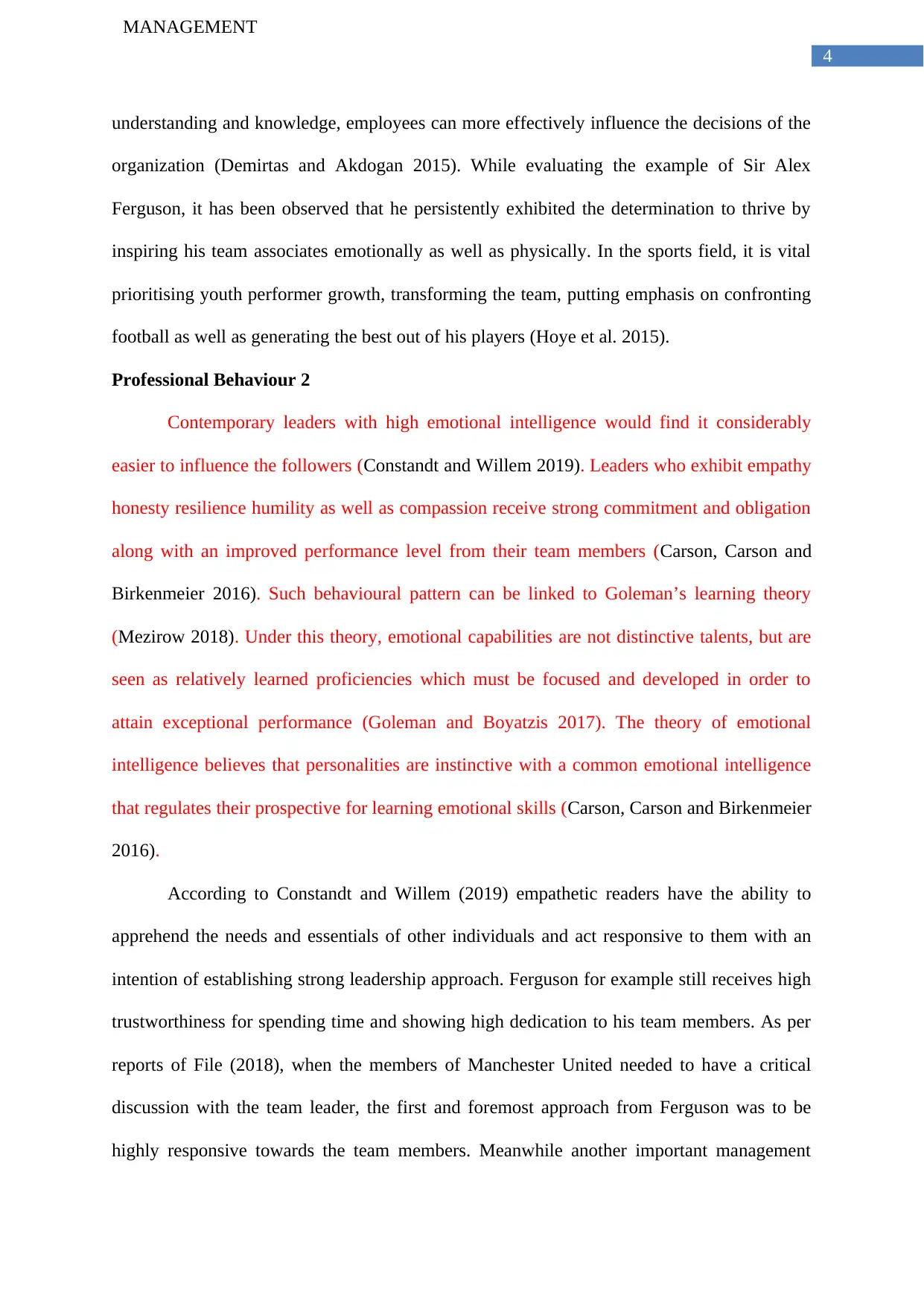
4
MANAGEMENT
understanding and knowledge, employees can more effectively influence the decisions of the
organization (Demirtas and Akdogan 2015). While evaluating the example of Sir Alex
Ferguson, it has been observed that he persistently exhibited the determination to thrive by
inspiring his team associates emotionally as well as physically. In the sports field, it is vital
prioritising youth performer growth, transforming the team, putting emphasis on confronting
football as well as generating the best out of his players (Hoye et al. 2015).
Professional Behaviour 2
Contemporary leaders with high emotional intelligence would find it considerably
easier to influence the followers (Constandt and Willem 2019). Leaders who exhibit empathy
honesty resilience humility as well as compassion receive strong commitment and obligation
along with an improved performance level from their team members (Carson, Carson and
Birkenmeier 2016). Such behavioural pattern can be linked to Goleman’s learning theory
(Mezirow 2018). Under this theory, emotional capabilities are not distinctive talents, but are
seen as relatively learned proficiencies which must be focused and developed in order to
attain exceptional performance (Goleman and Boyatzis 2017). The theory of emotional
intelligence believes that personalities are instinctive with a common emotional intelligence
that regulates their prospective for learning emotional skills (Carson, Carson and Birkenmeier
2016).
According to Constandt and Willem (2019) empathetic readers have the ability to
apprehend the needs and essentials of other individuals and act responsive to them with an
intention of establishing strong leadership approach. Ferguson for example still receives high
trustworthiness for spending time and showing high dedication to his team members. As per
reports of File (2018), when the members of Manchester United needed to have a critical
discussion with the team leader, the first and foremost approach from Ferguson was to be
highly responsive towards the team members. Meanwhile another important management
MANAGEMENT
understanding and knowledge, employees can more effectively influence the decisions of the
organization (Demirtas and Akdogan 2015). While evaluating the example of Sir Alex
Ferguson, it has been observed that he persistently exhibited the determination to thrive by
inspiring his team associates emotionally as well as physically. In the sports field, it is vital
prioritising youth performer growth, transforming the team, putting emphasis on confronting
football as well as generating the best out of his players (Hoye et al. 2015).
Professional Behaviour 2
Contemporary leaders with high emotional intelligence would find it considerably
easier to influence the followers (Constandt and Willem 2019). Leaders who exhibit empathy
honesty resilience humility as well as compassion receive strong commitment and obligation
along with an improved performance level from their team members (Carson, Carson and
Birkenmeier 2016). Such behavioural pattern can be linked to Goleman’s learning theory
(Mezirow 2018). Under this theory, emotional capabilities are not distinctive talents, but are
seen as relatively learned proficiencies which must be focused and developed in order to
attain exceptional performance (Goleman and Boyatzis 2017). The theory of emotional
intelligence believes that personalities are instinctive with a common emotional intelligence
that regulates their prospective for learning emotional skills (Carson, Carson and Birkenmeier
2016).
According to Constandt and Willem (2019) empathetic readers have the ability to
apprehend the needs and essentials of other individuals and act responsive to them with an
intention of establishing strong leadership approach. Ferguson for example still receives high
trustworthiness for spending time and showing high dedication to his team members. As per
reports of File (2018), when the members of Manchester United needed to have a critical
discussion with the team leader, the first and foremost approach from Ferguson was to be
highly responsive towards the team members. Meanwhile another important management
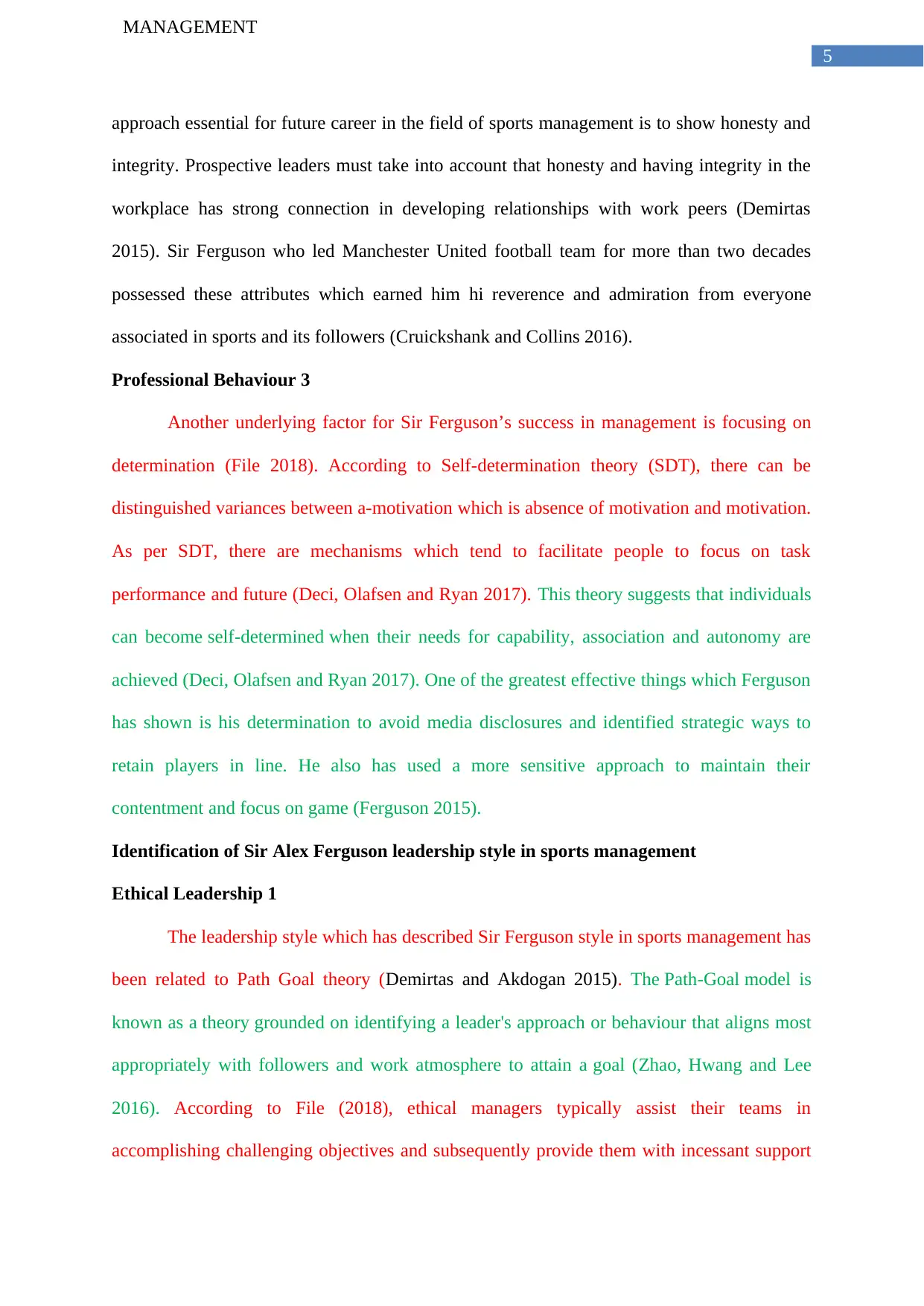
5
MANAGEMENT
approach essential for future career in the field of sports management is to show honesty and
integrity. Prospective leaders must take into account that honesty and having integrity in the
workplace has strong connection in developing relationships with work peers (Demirtas
2015). Sir Ferguson who led Manchester United football team for more than two decades
possessed these attributes which earned him hi reverence and admiration from everyone
associated in sports and its followers (Cruickshank and Collins 2016).
Professional Behaviour 3
Another underlying factor for Sir Ferguson’s success in management is focusing on
determination (File 2018). According to Self-determination theory (SDT), there can be
distinguished variances between a-motivation which is absence of motivation and motivation.
As per SDT, there are mechanisms which tend to facilitate people to focus on task
performance and future (Deci, Olafsen and Ryan 2017). This theory suggests that individuals
can become self-determined when their needs for capability, association and autonomy are
achieved (Deci, Olafsen and Ryan 2017). One of the greatest effective things which Ferguson
has shown is his determination to avoid media disclosures and identified strategic ways to
retain players in line. He also has used a more sensitive approach to maintain their
contentment and focus on game (Ferguson 2015).
Identification of Sir Alex Ferguson leadership style in sports management
Ethical Leadership 1
The leadership style which has described Sir Ferguson style in sports management has
been related to Path Goal theory (Demirtas and Akdogan 2015). The Path-Goal model is
known as a theory grounded on identifying a leader's approach or behaviour that aligns most
appropriately with followers and work atmosphere to attain a goal (Zhao, Hwang and Lee
2016). According to File (2018), ethical managers typically assist their teams in
accomplishing challenging objectives and subsequently provide them with incessant support
MANAGEMENT
approach essential for future career in the field of sports management is to show honesty and
integrity. Prospective leaders must take into account that honesty and having integrity in the
workplace has strong connection in developing relationships with work peers (Demirtas
2015). Sir Ferguson who led Manchester United football team for more than two decades
possessed these attributes which earned him hi reverence and admiration from everyone
associated in sports and its followers (Cruickshank and Collins 2016).
Professional Behaviour 3
Another underlying factor for Sir Ferguson’s success in management is focusing on
determination (File 2018). According to Self-determination theory (SDT), there can be
distinguished variances between a-motivation which is absence of motivation and motivation.
As per SDT, there are mechanisms which tend to facilitate people to focus on task
performance and future (Deci, Olafsen and Ryan 2017). This theory suggests that individuals
can become self-determined when their needs for capability, association and autonomy are
achieved (Deci, Olafsen and Ryan 2017). One of the greatest effective things which Ferguson
has shown is his determination to avoid media disclosures and identified strategic ways to
retain players in line. He also has used a more sensitive approach to maintain their
contentment and focus on game (Ferguson 2015).
Identification of Sir Alex Ferguson leadership style in sports management
Ethical Leadership 1
The leadership style which has described Sir Ferguson style in sports management has
been related to Path Goal theory (Demirtas and Akdogan 2015). The Path-Goal model is
known as a theory grounded on identifying a leader's approach or behaviour that aligns most
appropriately with followers and work atmosphere to attain a goal (Zhao, Hwang and Lee
2016). According to File (2018), ethical managers typically assist their teams in
accomplishing challenging objectives and subsequently provide them with incessant support
⊘ This is a preview!⊘
Do you want full access?
Subscribe today to unlock all pages.

Trusted by 1+ million students worldwide
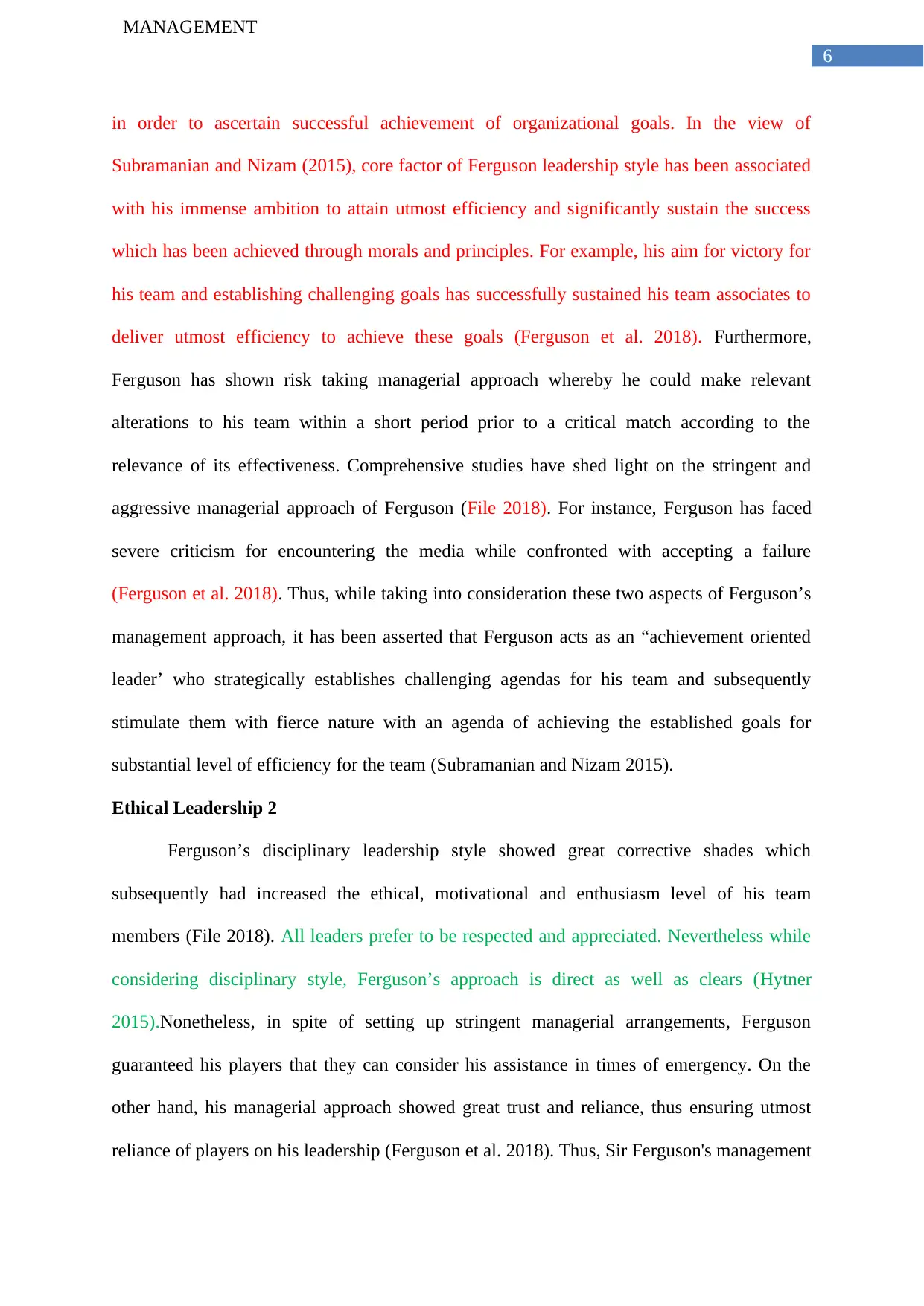
6
MANAGEMENT
in order to ascertain successful achievement of organizational goals. In the view of
Subramanian and Nizam (2015), core factor of Ferguson leadership style has been associated
with his immense ambition to attain utmost efficiency and significantly sustain the success
which has been achieved through morals and principles. For example, his aim for victory for
his team and establishing challenging goals has successfully sustained his team associates to
deliver utmost efficiency to achieve these goals (Ferguson et al. 2018). Furthermore,
Ferguson has shown risk taking managerial approach whereby he could make relevant
alterations to his team within a short period prior to a critical match according to the
relevance of its effectiveness. Comprehensive studies have shed light on the stringent and
aggressive managerial approach of Ferguson (File 2018). For instance, Ferguson has faced
severe criticism for encountering the media while confronted with accepting a failure
(Ferguson et al. 2018). Thus, while taking into consideration these two aspects of Ferguson’s
management approach, it has been asserted that Ferguson acts as an “achievement oriented
leader’ who strategically establishes challenging agendas for his team and subsequently
stimulate them with fierce nature with an agenda of achieving the established goals for
substantial level of efficiency for the team (Subramanian and Nizam 2015).
Ethical Leadership 2
Ferguson’s disciplinary leadership style showed great corrective shades which
subsequently had increased the ethical, motivational and enthusiasm level of his team
members (File 2018). All leaders prefer to be respected and appreciated. Nevertheless while
considering disciplinary style, Ferguson’s approach is direct as well as clears (Hytner
2015).Nonetheless, in spite of setting up stringent managerial arrangements, Ferguson
guaranteed his players that they can consider his assistance in times of emergency. On the
other hand, his managerial approach showed great trust and reliance, thus ensuring utmost
reliance of players on his leadership (Ferguson et al. 2018). Thus, Sir Ferguson's management
MANAGEMENT
in order to ascertain successful achievement of organizational goals. In the view of
Subramanian and Nizam (2015), core factor of Ferguson leadership style has been associated
with his immense ambition to attain utmost efficiency and significantly sustain the success
which has been achieved through morals and principles. For example, his aim for victory for
his team and establishing challenging goals has successfully sustained his team associates to
deliver utmost efficiency to achieve these goals (Ferguson et al. 2018). Furthermore,
Ferguson has shown risk taking managerial approach whereby he could make relevant
alterations to his team within a short period prior to a critical match according to the
relevance of its effectiveness. Comprehensive studies have shed light on the stringent and
aggressive managerial approach of Ferguson (File 2018). For instance, Ferguson has faced
severe criticism for encountering the media while confronted with accepting a failure
(Ferguson et al. 2018). Thus, while taking into consideration these two aspects of Ferguson’s
management approach, it has been asserted that Ferguson acts as an “achievement oriented
leader’ who strategically establishes challenging agendas for his team and subsequently
stimulate them with fierce nature with an agenda of achieving the established goals for
substantial level of efficiency for the team (Subramanian and Nizam 2015).
Ethical Leadership 2
Ferguson’s disciplinary leadership style showed great corrective shades which
subsequently had increased the ethical, motivational and enthusiasm level of his team
members (File 2018). All leaders prefer to be respected and appreciated. Nevertheless while
considering disciplinary style, Ferguson’s approach is direct as well as clears (Hytner
2015).Nonetheless, in spite of setting up stringent managerial arrangements, Ferguson
guaranteed his players that they can consider his assistance in times of emergency. On the
other hand, his managerial approach showed great trust and reliance, thus ensuring utmost
reliance of players on his leadership (Ferguson et al. 2018). Thus, Sir Ferguson's management
Paraphrase This Document
Need a fresh take? Get an instant paraphrase of this document with our AI Paraphraser
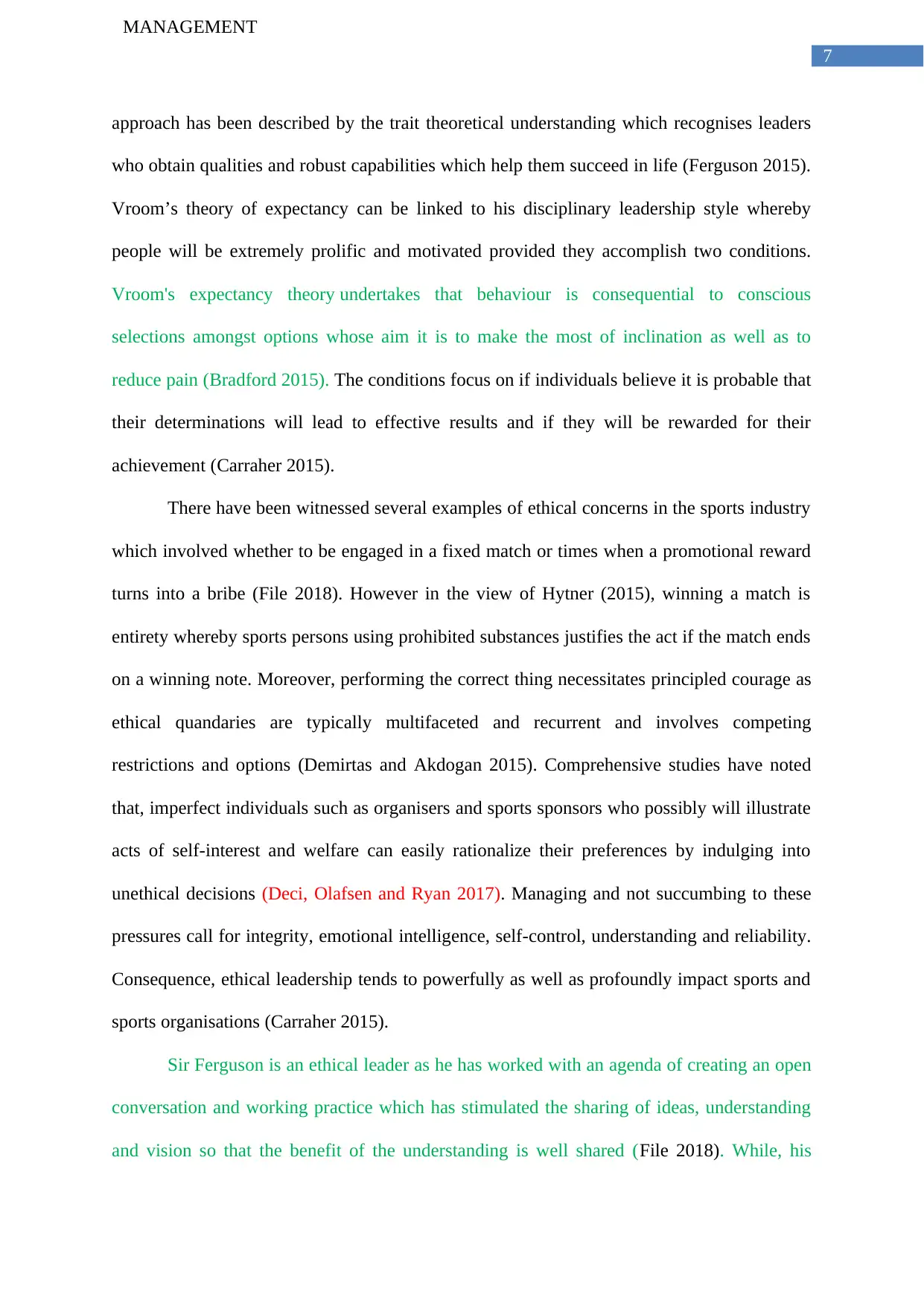
7
MANAGEMENT
approach has been described by the trait theoretical understanding which recognises leaders
who obtain qualities and robust capabilities which help them succeed in life (Ferguson 2015).
Vroom’s theory of expectancy can be linked to his disciplinary leadership style whereby
people will be extremely prolific and motivated provided they accomplish two conditions.
Vroom's expectancy theory undertakes that behaviour is consequential to conscious
selections amongst options whose aim it is to make the most of inclination as well as to
reduce pain (Bradford 2015). The conditions focus on if individuals believe it is probable that
their determinations will lead to effective results and if they will be rewarded for their
achievement (Carraher 2015).
There have been witnessed several examples of ethical concerns in the sports industry
which involved whether to be engaged in a fixed match or times when a promotional reward
turns into a bribe (File 2018). However in the view of Hytner (2015), winning a match is
entirety whereby sports persons using prohibited substances justifies the act if the match ends
on a winning note. Moreover, performing the correct thing necessitates principled courage as
ethical quandaries are typically multifaceted and recurrent and involves competing
restrictions and options (Demirtas and Akdogan 2015). Comprehensive studies have noted
that, imperfect individuals such as organisers and sports sponsors who possibly will illustrate
acts of self-interest and welfare can easily rationalize their preferences by indulging into
unethical decisions (Deci, Olafsen and Ryan 2017). Managing and not succumbing to these
pressures call for integrity, emotional intelligence, self-control, understanding and reliability.
Consequence, ethical leadership tends to powerfully as well as profoundly impact sports and
sports organisations (Carraher 2015).
Sir Ferguson is an ethical leader as he has worked with an agenda of creating an open
conversation and working practice which has stimulated the sharing of ideas, understanding
and vision so that the benefit of the understanding is well shared (File 2018). While, his
MANAGEMENT
approach has been described by the trait theoretical understanding which recognises leaders
who obtain qualities and robust capabilities which help them succeed in life (Ferguson 2015).
Vroom’s theory of expectancy can be linked to his disciplinary leadership style whereby
people will be extremely prolific and motivated provided they accomplish two conditions.
Vroom's expectancy theory undertakes that behaviour is consequential to conscious
selections amongst options whose aim it is to make the most of inclination as well as to
reduce pain (Bradford 2015). The conditions focus on if individuals believe it is probable that
their determinations will lead to effective results and if they will be rewarded for their
achievement (Carraher 2015).
There have been witnessed several examples of ethical concerns in the sports industry
which involved whether to be engaged in a fixed match or times when a promotional reward
turns into a bribe (File 2018). However in the view of Hytner (2015), winning a match is
entirety whereby sports persons using prohibited substances justifies the act if the match ends
on a winning note. Moreover, performing the correct thing necessitates principled courage as
ethical quandaries are typically multifaceted and recurrent and involves competing
restrictions and options (Demirtas and Akdogan 2015). Comprehensive studies have noted
that, imperfect individuals such as organisers and sports sponsors who possibly will illustrate
acts of self-interest and welfare can easily rationalize their preferences by indulging into
unethical decisions (Deci, Olafsen and Ryan 2017). Managing and not succumbing to these
pressures call for integrity, emotional intelligence, self-control, understanding and reliability.
Consequence, ethical leadership tends to powerfully as well as profoundly impact sports and
sports organisations (Carraher 2015).
Sir Ferguson is an ethical leader as he has worked with an agenda of creating an open
conversation and working practice which has stimulated the sharing of ideas, understanding
and vision so that the benefit of the understanding is well shared (File 2018). While, his
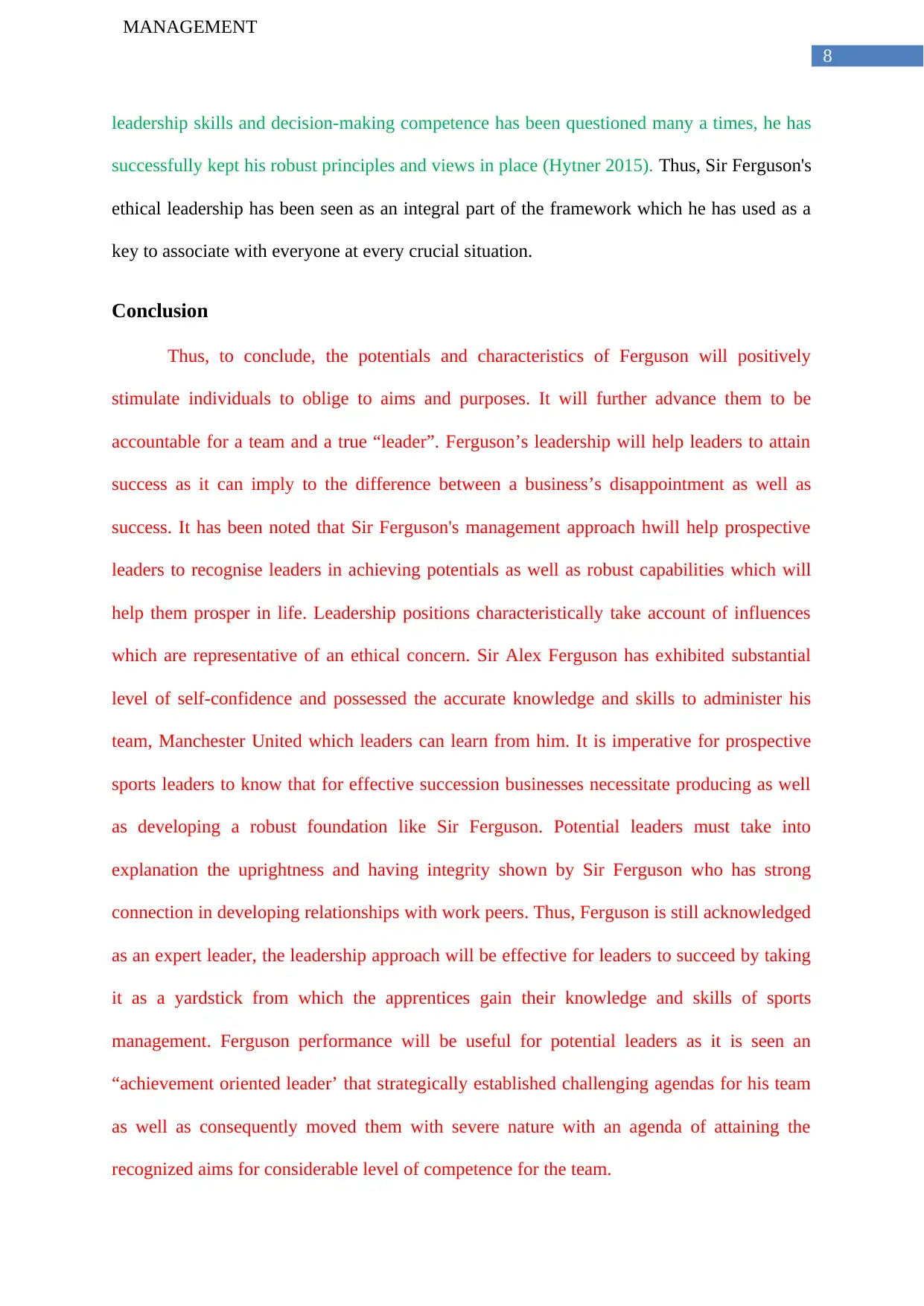
8
MANAGEMENT
leadership skills and decision-making competence has been questioned many a times, he has
successfully kept his robust principles and views in place (Hytner 2015). Thus, Sir Ferguson's
ethical leadership has been seen as an integral part of the framework which he has used as a
key to associate with everyone at every crucial situation.
Conclusion
Thus, to conclude, the potentials and characteristics of Ferguson will positively
stimulate individuals to oblige to aims and purposes. It will further advance them to be
accountable for a team and a true “leader”. Ferguson’s leadership will help leaders to attain
success as it can imply to the difference between a business’s disappointment as well as
success. It has been noted that Sir Ferguson's management approach hwill help prospective
leaders to recognise leaders in achieving potentials as well as robust capabilities which will
help them prosper in life. Leadership positions characteristically take account of influences
which are representative of an ethical concern. Sir Alex Ferguson has exhibited substantial
level of self-confidence and possessed the accurate knowledge and skills to administer his
team, Manchester United which leaders can learn from him. It is imperative for prospective
sports leaders to know that for effective succession businesses necessitate producing as well
as developing a robust foundation like Sir Ferguson. Potential leaders must take into
explanation the uprightness and having integrity shown by Sir Ferguson who has strong
connection in developing relationships with work peers. Thus, Ferguson is still acknowledged
as an expert leader, the leadership approach will be effective for leaders to succeed by taking
it as a yardstick from which the apprentices gain their knowledge and skills of sports
management. Ferguson performance will be useful for potential leaders as it is seen an
“achievement oriented leader’ that strategically established challenging agendas for his team
as well as consequently moved them with severe nature with an agenda of attaining the
recognized aims for considerable level of competence for the team.
MANAGEMENT
leadership skills and decision-making competence has been questioned many a times, he has
successfully kept his robust principles and views in place (Hytner 2015). Thus, Sir Ferguson's
ethical leadership has been seen as an integral part of the framework which he has used as a
key to associate with everyone at every crucial situation.
Conclusion
Thus, to conclude, the potentials and characteristics of Ferguson will positively
stimulate individuals to oblige to aims and purposes. It will further advance them to be
accountable for a team and a true “leader”. Ferguson’s leadership will help leaders to attain
success as it can imply to the difference between a business’s disappointment as well as
success. It has been noted that Sir Ferguson's management approach hwill help prospective
leaders to recognise leaders in achieving potentials as well as robust capabilities which will
help them prosper in life. Leadership positions characteristically take account of influences
which are representative of an ethical concern. Sir Alex Ferguson has exhibited substantial
level of self-confidence and possessed the accurate knowledge and skills to administer his
team, Manchester United which leaders can learn from him. It is imperative for prospective
sports leaders to know that for effective succession businesses necessitate producing as well
as developing a robust foundation like Sir Ferguson. Potential leaders must take into
explanation the uprightness and having integrity shown by Sir Ferguson who has strong
connection in developing relationships with work peers. Thus, Ferguson is still acknowledged
as an expert leader, the leadership approach will be effective for leaders to succeed by taking
it as a yardstick from which the apprentices gain their knowledge and skills of sports
management. Ferguson performance will be useful for potential leaders as it is seen an
“achievement oriented leader’ that strategically established challenging agendas for his team
as well as consequently moved them with severe nature with an agenda of attaining the
recognized aims for considerable level of competence for the team.
⊘ This is a preview!⊘
Do you want full access?
Subscribe today to unlock all pages.

Trusted by 1+ million students worldwide

9
MANAGEMENT
MANAGEMENT
Paraphrase This Document
Need a fresh take? Get an instant paraphrase of this document with our AI Paraphraser
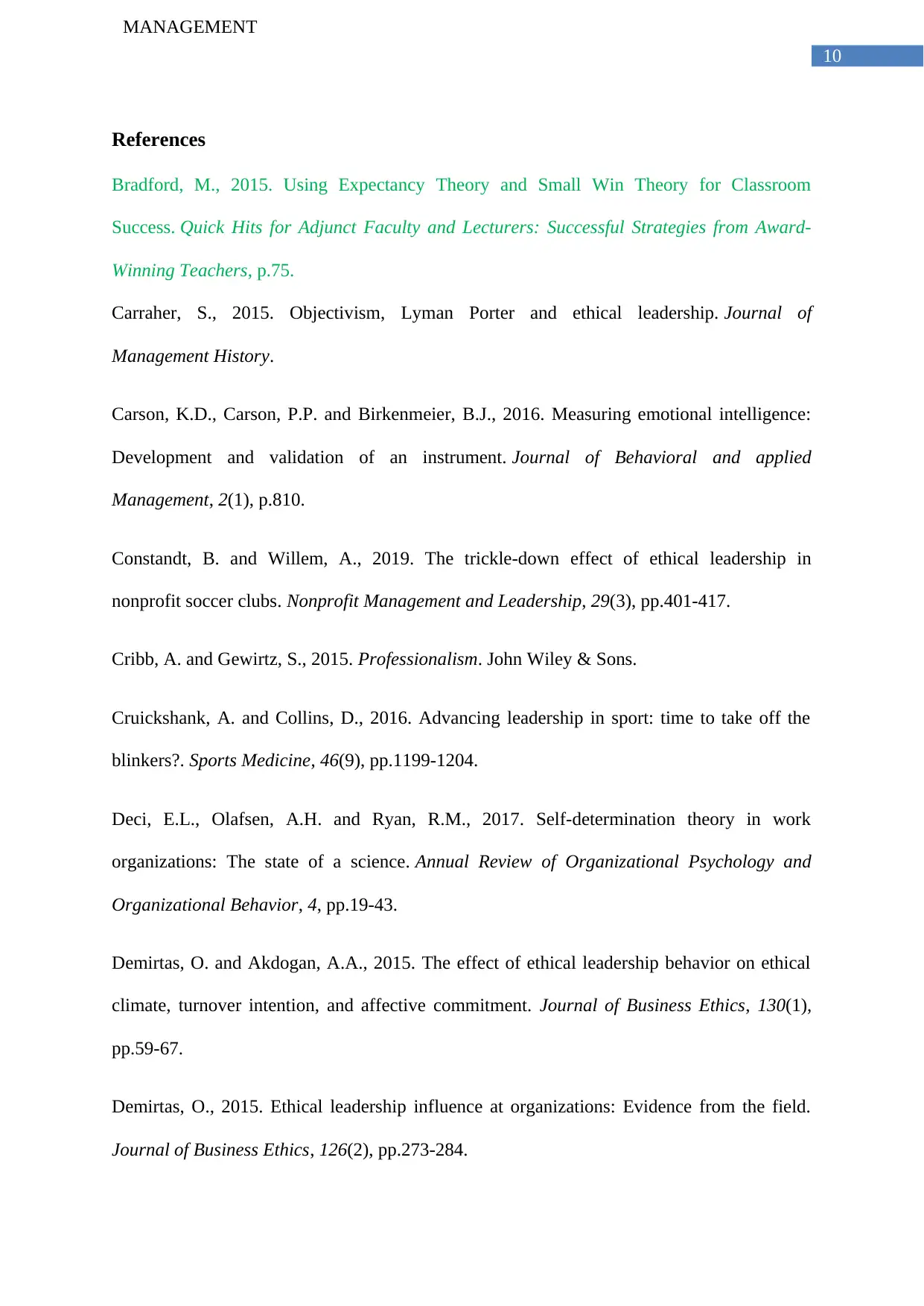
10
MANAGEMENT
References
Bradford, M., 2015. Using Expectancy Theory and Small Win Theory for Classroom
Success. Quick Hits for Adjunct Faculty and Lecturers: Successful Strategies from Award-
Winning Teachers, p.75.
Carraher, S., 2015. Objectivism, Lyman Porter and ethical leadership. Journal of
Management History.
Carson, K.D., Carson, P.P. and Birkenmeier, B.J., 2016. Measuring emotional intelligence:
Development and validation of an instrument. Journal of Behavioral and applied
Management, 2(1), p.810.
Constandt, B. and Willem, A., 2019. The trickle‐down effect of ethical leadership in
nonprofit soccer clubs. Nonprofit Management and Leadership, 29(3), pp.401-417.
Cribb, A. and Gewirtz, S., 2015. Professionalism. John Wiley & Sons.
Cruickshank, A. and Collins, D., 2016. Advancing leadership in sport: time to take off the
blinkers?. Sports Medicine, 46(9), pp.1199-1204.
Deci, E.L., Olafsen, A.H. and Ryan, R.M., 2017. Self-determination theory in work
organizations: The state of a science. Annual Review of Organizational Psychology and
Organizational Behavior, 4, pp.19-43.
Demirtas, O. and Akdogan, A.A., 2015. The effect of ethical leadership behavior on ethical
climate, turnover intention, and affective commitment. Journal of Business Ethics, 130(1),
pp.59-67.
Demirtas, O., 2015. Ethical leadership influence at organizations: Evidence from the field.
Journal of Business Ethics, 126(2), pp.273-284.
MANAGEMENT
References
Bradford, M., 2015. Using Expectancy Theory and Small Win Theory for Classroom
Success. Quick Hits for Adjunct Faculty and Lecturers: Successful Strategies from Award-
Winning Teachers, p.75.
Carraher, S., 2015. Objectivism, Lyman Porter and ethical leadership. Journal of
Management History.
Carson, K.D., Carson, P.P. and Birkenmeier, B.J., 2016. Measuring emotional intelligence:
Development and validation of an instrument. Journal of Behavioral and applied
Management, 2(1), p.810.
Constandt, B. and Willem, A., 2019. The trickle‐down effect of ethical leadership in
nonprofit soccer clubs. Nonprofit Management and Leadership, 29(3), pp.401-417.
Cribb, A. and Gewirtz, S., 2015. Professionalism. John Wiley & Sons.
Cruickshank, A. and Collins, D., 2016. Advancing leadership in sport: time to take off the
blinkers?. Sports Medicine, 46(9), pp.1199-1204.
Deci, E.L., Olafsen, A.H. and Ryan, R.M., 2017. Self-determination theory in work
organizations: The state of a science. Annual Review of Organizational Psychology and
Organizational Behavior, 4, pp.19-43.
Demirtas, O. and Akdogan, A.A., 2015. The effect of ethical leadership behavior on ethical
climate, turnover intention, and affective commitment. Journal of Business Ethics, 130(1),
pp.59-67.
Demirtas, O., 2015. Ethical leadership influence at organizations: Evidence from the field.
Journal of Business Ethics, 126(2), pp.273-284.
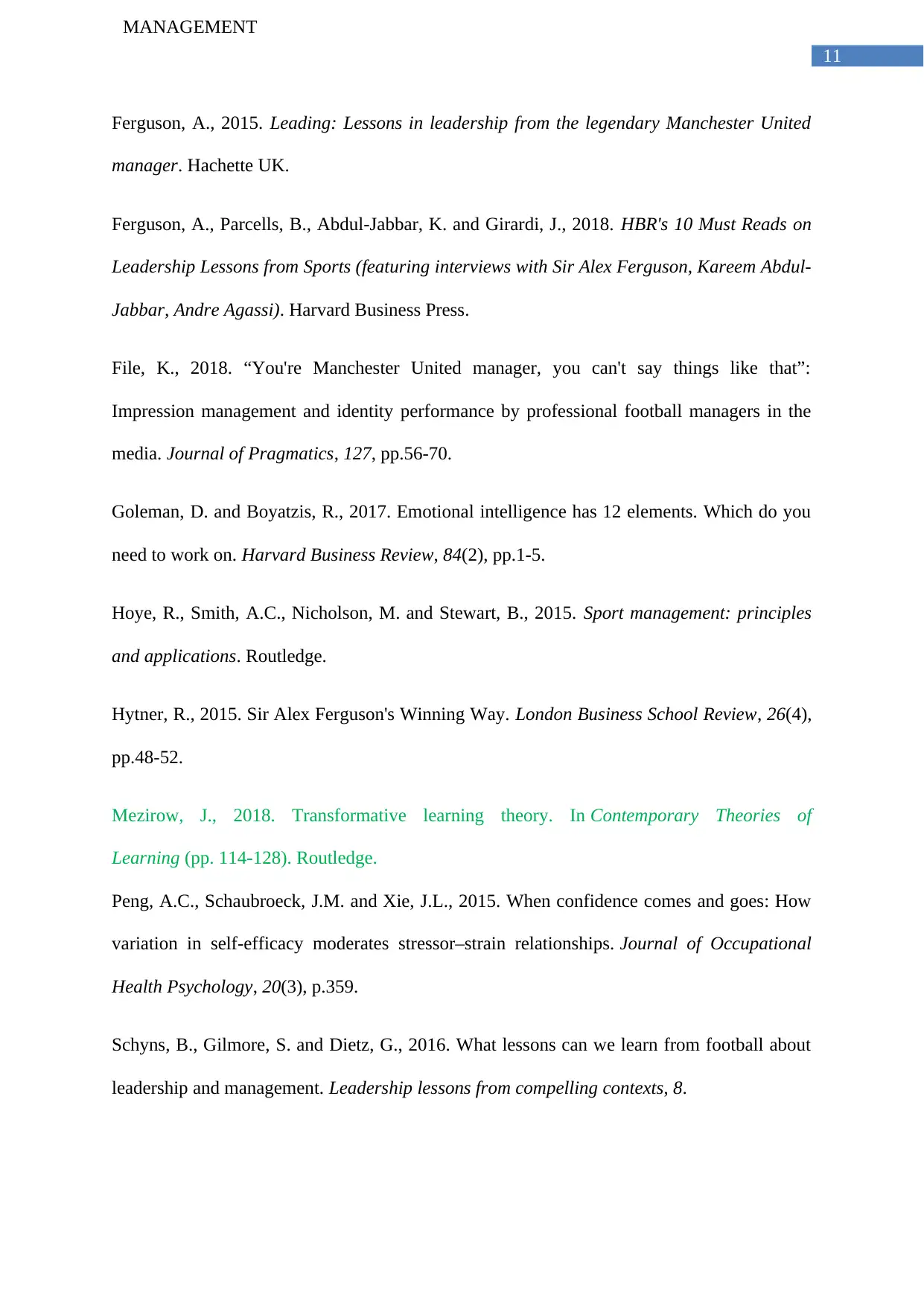
11
MANAGEMENT
Ferguson, A., 2015. Leading: Lessons in leadership from the legendary Manchester United
manager. Hachette UK.
Ferguson, A., Parcells, B., Abdul-Jabbar, K. and Girardi, J., 2018. HBR's 10 Must Reads on
Leadership Lessons from Sports (featuring interviews with Sir Alex Ferguson, Kareem Abdul-
Jabbar, Andre Agassi). Harvard Business Press.
File, K., 2018. “You're Manchester United manager, you can't say things like that”:
Impression management and identity performance by professional football managers in the
media. Journal of Pragmatics, 127, pp.56-70.
Goleman, D. and Boyatzis, R., 2017. Emotional intelligence has 12 elements. Which do you
need to work on. Harvard Business Review, 84(2), pp.1-5.
Hoye, R., Smith, A.C., Nicholson, M. and Stewart, B., 2015. Sport management: principles
and applications. Routledge.
Hytner, R., 2015. Sir Alex Ferguson's Winning Way. London Business School Review, 26(4),
pp.48-52.
Mezirow, J., 2018. Transformative learning theory. In Contemporary Theories of
Learning (pp. 114-128). Routledge.
Peng, A.C., Schaubroeck, J.M. and Xie, J.L., 2015. When confidence comes and goes: How
variation in self-efficacy moderates stressor–strain relationships. Journal of Occupational
Health Psychology, 20(3), p.359.
Schyns, B., Gilmore, S. and Dietz, G., 2016. What lessons can we learn from football about
leadership and management. Leadership lessons from compelling contexts, 8.
MANAGEMENT
Ferguson, A., 2015. Leading: Lessons in leadership from the legendary Manchester United
manager. Hachette UK.
Ferguson, A., Parcells, B., Abdul-Jabbar, K. and Girardi, J., 2018. HBR's 10 Must Reads on
Leadership Lessons from Sports (featuring interviews with Sir Alex Ferguson, Kareem Abdul-
Jabbar, Andre Agassi). Harvard Business Press.
File, K., 2018. “You're Manchester United manager, you can't say things like that”:
Impression management and identity performance by professional football managers in the
media. Journal of Pragmatics, 127, pp.56-70.
Goleman, D. and Boyatzis, R., 2017. Emotional intelligence has 12 elements. Which do you
need to work on. Harvard Business Review, 84(2), pp.1-5.
Hoye, R., Smith, A.C., Nicholson, M. and Stewart, B., 2015. Sport management: principles
and applications. Routledge.
Hytner, R., 2015. Sir Alex Ferguson's Winning Way. London Business School Review, 26(4),
pp.48-52.
Mezirow, J., 2018. Transformative learning theory. In Contemporary Theories of
Learning (pp. 114-128). Routledge.
Peng, A.C., Schaubroeck, J.M. and Xie, J.L., 2015. When confidence comes and goes: How
variation in self-efficacy moderates stressor–strain relationships. Journal of Occupational
Health Psychology, 20(3), p.359.
Schyns, B., Gilmore, S. and Dietz, G., 2016. What lessons can we learn from football about
leadership and management. Leadership lessons from compelling contexts, 8.
⊘ This is a preview!⊘
Do you want full access?
Subscribe today to unlock all pages.

Trusted by 1+ million students worldwide
1 out of 13
Your All-in-One AI-Powered Toolkit for Academic Success.
+13062052269
info@desklib.com
Available 24*7 on WhatsApp / Email
![[object Object]](/_next/static/media/star-bottom.7253800d.svg)
Unlock your academic potential
Copyright © 2020–2026 A2Z Services. All Rights Reserved. Developed and managed by ZUCOL.


